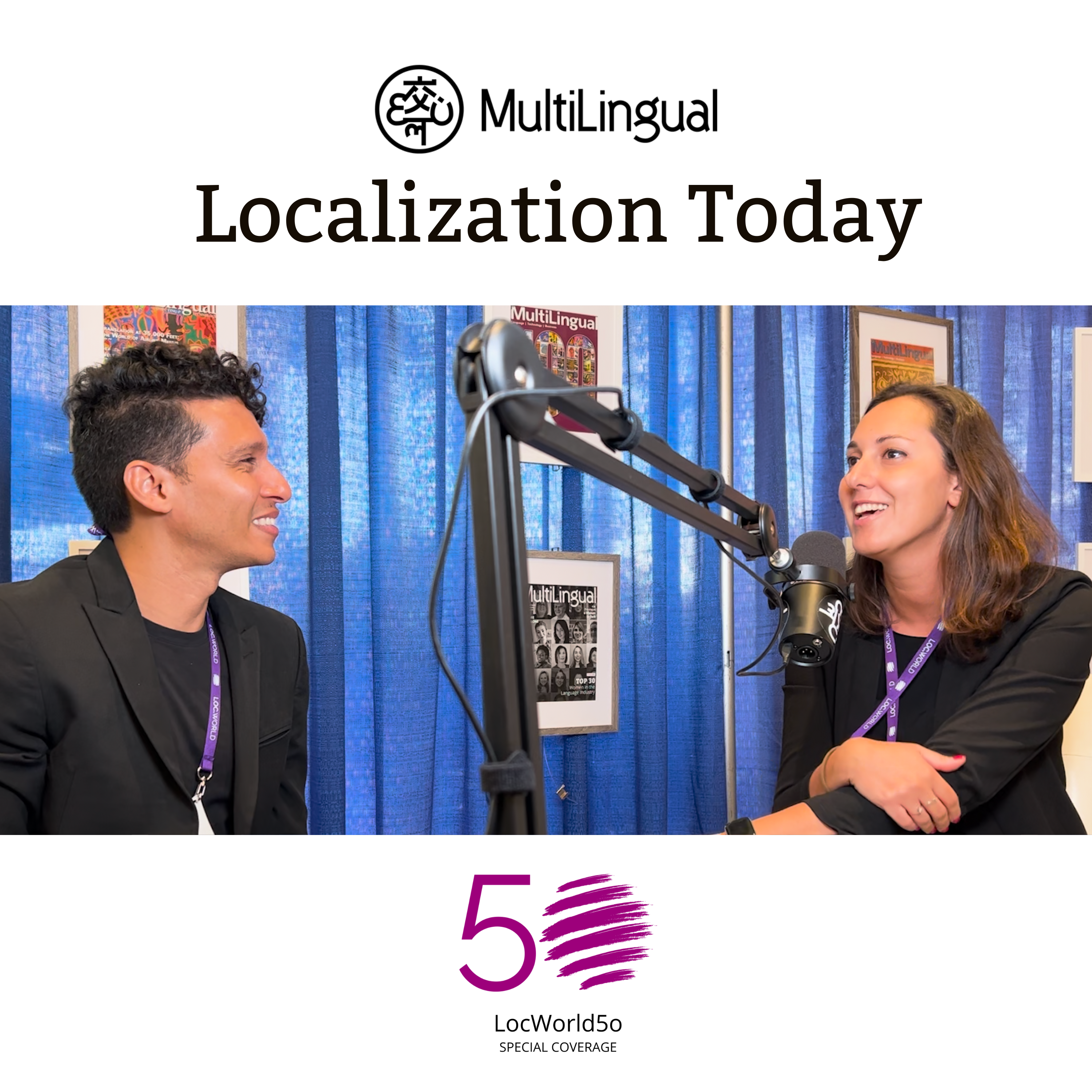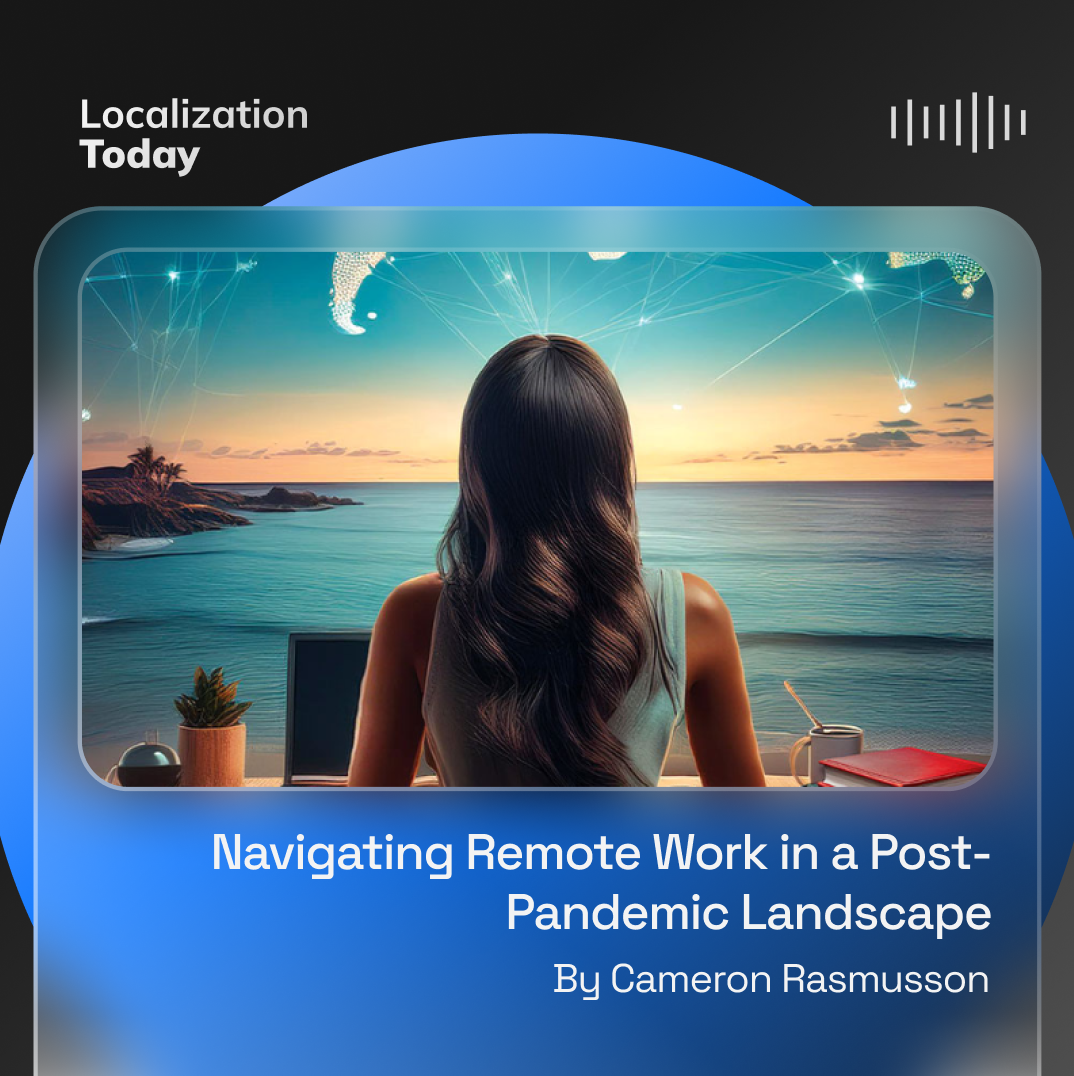Episode Transcript
[00:00:06] Speaker A: This is localization Today, a podcast from multilingual media covering the most relevant daily news in the language industry.
[00:00:15] Speaker B: Negotiating deals in the localization industry it's.
[00:00:19] Speaker C: The end of the gregorian calendar year, and for many people in business that.
[00:00:23] Speaker D: Means it's time to shop, and not.
[00:00:25] Speaker B: Just for holiday gifts.
[00:00:27] Speaker D: It's a natural time to approach existing.
[00:00:30] Speaker C: Clients for renewals and prospect for new sales as businesses are allocating their budgets.
[00:00:35] Speaker B: For the upcoming year.
[00:00:37] Speaker D: However, the holiday season also presents a.
[00:00:40] Speaker C: Challenge for B two b sales in Q four as many offices close and.
[00:00:44] Speaker B: People take vacations, sales teams find that.
[00:00:48] Speaker C: Close rates drop ten to 20% in.
[00:00:50] Speaker B: December, which is why prospecting is important all year.
[00:00:54] Speaker D: To boost your close rates, multilingual reached.
[00:00:57] Speaker C: Out to six consultants and sales specialists who focus on the language industry space.
[00:01:01] Speaker B: And asked for their insights knowledge is power while lsps offer a variety of.
[00:01:08] Speaker C: Solutions, it's more important for salespeople to understand the client's goals, needs and challenges in the context of language services before offering them any solution, said Jessica Rathke, CEO of Fluent Sales.
Indeed, a marketing communications manager will likely.
[00:01:26] Speaker D: Be very concerned about brand consistency across all international markets. This could require overcoming important cultural nuances.
[00:01:35] Speaker C: While maintaining consistency of message, whereas someone.
[00:01:38] Speaker D: In technical communications won't find cultural adaptation necessary. Beyond that, we serve people in legal.
[00:01:45] Speaker C: Financial, regulatory compliance, hr, elearning and a.
[00:01:50] Speaker B: Host of other roles.
[00:01:52] Speaker D: The outcomes that translation localization helps each.
[00:01:55] Speaker C: Of these folks deliver are as different as the roles themselves.
Yes, all by language services, but the.
[00:02:02] Speaker D: Services needed are buyerspecific. Patricia Palladini thinks that the key is.
[00:02:07] Speaker C: Not only to identify the client's needs, but also to reflect these needs back in a way that helps a client.
[00:02:13] Speaker B: Understand how beneficial a suggested solution will be.
[00:02:17] Speaker D: This may be a challenge as clients.
[00:02:19] Speaker C: May have a biased vision of their needs that in the context of the.
[00:02:23] Speaker D: Latest trends in localization may be no longer accurate. She shares the following experience one of.
[00:02:29] Speaker C: My clients wanted to build an external localization team from scratch supported by an LSP selected via an RFP process.
So basically this was the vision, design.
[00:02:41] Speaker D: And run an RFP.
However, the client was not aware that.
[00:02:46] Speaker C: The tricky and critical part here was not the RFP itself, but defining all the processes, tools, documentation and KPIs to onboard the LSP after the selection process.
So running just the RFP will not make the client happy as this is.
[00:03:03] Speaker D: Just a part of the client needs.
However, communicating the needs the client may.
[00:03:08] Speaker C: Not be aware of and supporting the client to communicate the required approach to their stakeholders to get buy in was one of the keys to secure a.
[00:03:16] Speaker D: Project'S success, thus making the client happy.
Ensuring that a customer understands what they.
[00:03:22] Speaker C: Are buying is just as crucial, especially.
[00:03:24] Speaker D: In localization, said Alessandro Benazi of global sites consulting. Localization services are complex and can involve various components that are often unfamiliar to clients. Educating clients about the process, potential challenges.
[00:03:40] Speaker C: And the value of specific services fosters a better understanding and realistic expectations.
[00:03:46] Speaker D: Ultimately, clear communication builds trust between the.
[00:03:50] Speaker C: Client and the consultant, which facilitates a successful execution of the project and creates the basis for long term collaboration.
[00:03:58] Speaker D: I don't think anyone wins if there.
[00:04:00] Speaker C: Isn'T clarity and transparency throughout the sales.
[00:04:03] Speaker B: Cycle, said Kristin Gutierrez, author of be a sales leader.
[00:04:07] Speaker D: The onus is on the sales side.
[00:04:09] Speaker B: To make sure your buyer understands what they are buying. If you've worked at more than one.
[00:04:14] Speaker C: Vendor or had a buyer send you another quote they received to compare, then you know we are all selling the.
[00:04:20] Speaker B: Same thing but calling things something different, Gutierrez noted.
[00:04:25] Speaker D: Post localization testing can also be called simply QA. Some vendors show charges for fuzzy matches, whereas others don't. Some clients are detail oriented and prefer.
[00:04:37] Speaker C: To see the fine print of the.
[00:04:38] Speaker B: Quote, whereas others simply compare total cost, Gutierrez continued.
[00:04:43] Speaker C: Deliver your quote as you normally would.
[00:04:45] Speaker B: But ask their expectations upfront if it's.
[00:04:48] Speaker C: The first time working with them. Pre schedule a follow up call with anyone on their side who is involved in making the decision so you can.
[00:04:55] Speaker B: Walk through your quote. Don't sell past the sale I've lost.
[00:05:00] Speaker C: A few memorable deals because we wanted to educate the buyer and they simply.
[00:05:04] Speaker D: Wanted the lowest price.
Yet I've won a lot more deals.
[00:05:08] Speaker C: Because of being open, honest and transparent about what we were offering in relation.
[00:05:13] Speaker B: To what they were buying. Gutierrez shared a clever way to leverage.
[00:05:17] Speaker D: A client's personal ambition. Next time you get on the phone.
[00:05:21] Speaker C: With your stakeholder, ask them how you.
[00:05:23] Speaker D: Can help them look better to their boss.
[00:05:25] Speaker B: And of those who ask why they.
[00:05:27] Speaker C: Can'T just use Google MT for their project, she said.
[00:05:31] Speaker D: That's a great place to start a conversation.
Change is the only constant Rathke highlights.
[00:05:36] Speaker C: The impact of global economy, politics and.
[00:05:39] Speaker D: Other uncertainties over time. My career started in software localization when.
[00:05:45] Speaker C: The EU was harmonizing their economies, and software companies in the US were keen to exploit this opportunity.
[00:05:52] Speaker B: I was not the most tech savvy.
[00:05:54] Speaker C: Person in the world, and I knew that if I didn't learn to talk with software developers intelligently, I was not.
[00:05:59] Speaker B: Going to last long. I bought all kinds of dummies guidebooks.
[00:06:03] Speaker C: And asked a lot of questions of the PM and technical teams, which ultimately paid off and made the biggest single.
[00:06:10] Speaker B: Sale in the LSP's history, she continued.
[00:06:13] Speaker C: When I moved to another LSP, I was responsible for selling translation services to.
[00:06:18] Speaker D: Pharmaceutical companies and pharma marketing agencies. The combination of services these clients needed.
[00:06:25] Speaker C: Was completely different from what I had sold in the past, and I found myself unable to connect with buyers using software localization speak.
[00:06:33] Speaker B: Once again, I had to adapt.
[00:06:36] Speaker D: In this case, it was developing expertise.
[00:06:39] Speaker C: In EU pharma regulations and helping prospects understand how we could help them to comply from a linguistic perspective and processes.
[00:06:46] Speaker B: Necessary to make that happen.
[00:06:48] Speaker D: Now, in 2023, buyers have become more cautious than ever when considering a new vendor, she explains. Risk aversion, budgetary constraints, multiple decision maker.
[00:07:00] Speaker C: Situations, as well as the promise of artificial intelligence AI have all contributed to.
[00:07:06] Speaker D: A reluctance for change.
This is on top of the longstanding.
[00:07:10] Speaker C: Trend of buyers wanting sellers to understand their role, industry and how translation and related services can benefit them before making contact.
[00:07:19] Speaker D: Sellers who push services onto prospects are.
[00:07:22] Speaker B: Usually and instantly eliminated.
[00:07:25] Speaker D: This insight was echoed by Benazi neural.
[00:07:28] Speaker C: Machine translation has improved translation quality, but it has also raised expectations.
[00:07:35] Speaker D: Machine translation and AI now surface early in discussions, often initiating conversations from the project's outset.
[00:07:44] Speaker B: Does this mean your best bet is.
[00:07:46] Speaker C: To present your best tools and processes.
[00:07:48] Speaker B: From the get go?
[00:07:50] Speaker D: John E. Flannery of flannery sales Systems.
[00:07:53] Speaker B: FSS added a thoughtful angle.
[00:07:56] Speaker D: The number of solutions offered is driven.
[00:07:58] Speaker C: By the number of challenges you are.
[00:08:00] Speaker D: Helping a buyer address to reach their business objectives.
[00:08:04] Speaker B: The ratio is not linear when it.
[00:08:07] Speaker C: Comes to pitching technologies. Binazzi stresses the importance of aligning localization strategies with company growth plans to ensure.
[00:08:14] Speaker D: Adaptability and scalability amid evolving technologies. Beyond addressing immediate needs, consider the medium.
[00:08:22] Speaker B: To medium long term.
[00:08:24] Speaker D: While planning for immediate needs is important.
[00:08:26] Speaker C: Being agile and ready to adjust with.
[00:08:29] Speaker D: New technological advancements is equally crucial.
[00:08:32] Speaker B: The emphasis is on fostering a proactive.
[00:08:35] Speaker C: Approach that considers both current requirements and the dynamic nature of technology, encouraging clients.
[00:08:41] Speaker B: To embrace innovation and stay ahead of the curve.
[00:08:44] Speaker D: At the same time, Palladini advises not getting too focused on the tools during a conversation.
No matter how good tools are, how.
[00:08:53] Speaker C: Well designed processes are, if you do not manage to engage the people, you.
[00:08:57] Speaker B: Will not make the client happy.
[00:09:00] Speaker D: Personalization Rathke repeats the same recommendation to.
[00:09:03] Speaker B: LSP salespeople over and over until you.
[00:09:07] Speaker C: Stop calling and emailing prospects with zero personalization. I'll keep saying this buyers want you to proactively understand how language services fit into their specific role, the goals it helps them achieve, and any challenges they.
[00:09:20] Speaker D: Are experiencing that prevent a successful outcome. Once all of this is understood, the.
[00:09:26] Speaker C: Salesperson can create and communicate a client specific solution comprised of whatever service or.
[00:09:31] Speaker D: Combination of services meet the client's immediate needs. This may not be a giant project.
[00:09:37] Speaker C: Award, but clients today typically start small and gradually increase volume, number of languages and services.
[00:09:44] Speaker B: As you continue to deliver successfully, gone.
[00:09:47] Speaker C: Are the days that clients will award an LSPO large percentage of their budget.
[00:09:51] Speaker D: Unless there is a super compelling reason to do so.
Nancy Honnell is of the opinion that.
[00:09:57] Speaker C: Finding the ideal solution for a client is about finding the one that perfectly.
[00:10:01] Speaker D: Aligns with their context and objectives. It's crucial to avoid overwhelming the client.
[00:10:07] Speaker B: With an abundance of choices.
[00:10:09] Speaker D: My preferred approach is deeply rooted in collaboration and consultation. Fostering a strong partnership with each client. Engaging in a thorough understanding of their.
[00:10:19] Speaker C: Needs, challenges and goals enables a salesperson to tailor solutions that are not just.
[00:10:25] Speaker D: Fitting, but also innovative and impactful. On the other hand, Flannery cautions against.
[00:10:30] Speaker B: Being too familiar from the get go.
[00:10:33] Speaker D: Many sellers try to get buyers to like them or establish rapport too soon. This has a negative effect.
[00:10:40] Speaker B: If the buyer engages on a personal.
[00:10:42] Speaker D: Level, I go with it in a limited capacity. It's a different story with referrals, as the groundwork may be laid for you.
[00:10:49] Speaker B: From that valuable introduction measuring success Flannery.
[00:10:53] Speaker C: Recalls when John Lennon was young and someone asked him what he wanted to.
[00:10:57] Speaker B: Be when he grew up, Lennon said, happy.
[00:11:01] Speaker C: I'm not sure it's the first measurement or KPI that we should track, yet it is important.
[00:11:07] Speaker D: Helping customers meet and exceed their business.
[00:11:10] Speaker B: Targets is the main goal. Being happy would be icing on the cake.
[00:11:15] Speaker D: According to Palladini, when defining a project.
[00:11:18] Speaker C: There are many potential wins for both.
[00:11:20] Speaker B: The consultant and the client.
[00:11:23] Speaker C: Obviously, both parties have to win, but in my experience, the equal benefits should.
[00:11:28] Speaker B: Not be a goal.
[00:11:30] Speaker D: There are many situations in which a.
[00:11:32] Speaker C: Deal may imply a medium economic revenue for the consultant. However, it may open many future doors.
[00:11:38] Speaker B: So it becomes a winwin. It could also be the case that.
[00:11:42] Speaker C: A project gives the consultant the opportunity to collaborate with top of industry colleagues, an opportunity to grow knowledge in an.
[00:11:49] Speaker D: Area that could become of expertise in the future.
However, starting out with equal expectations doesn't ensure equal satisfaction at the finish line. Honnell has a suggestion for what to do if that's the case.
[00:12:03] Speaker B: When a partnership with a client is.
[00:12:05] Speaker D: Not a win win, my recommendation is.
[00:12:08] Speaker B: To reassess the business model.
[00:12:10] Speaker D: It may involve enhancing AI or automation.
[00:12:13] Speaker C: Or introducing value propositions that resonate with.
[00:12:16] Speaker B: The client and justify their investment operating.
[00:12:19] Speaker C: In a non mutually beneficial partnership will.
[00:12:22] Speaker D: Compromise quality, sustainability, and happiness at work. For instance, when an RFP doesn't offer.
[00:12:29] Speaker C: Potential for profit or strategic benefit, it might be wise to let it go.
[00:12:33] Speaker D: And prioritize engagements that promise a genuine win win outcome. The bottom line Rathke sums up what.
[00:12:40] Speaker C: Seems to be a consensus among those.
[00:12:42] Speaker D: Working to assist in buying and selling in our industry.
[00:12:45] Speaker B: The better we understand our target clients.
[00:12:48] Speaker C: The more traction we gain in the first instance, and the more engaged we will be throughout the sales process.
[00:12:54] Speaker D: We won't win them all, but our.
[00:12:56] Speaker C: Chances are greatly increased if we can.
[00:12:58] Speaker D: Sell from the client's perspective rather than our own.
[00:13:02] Speaker B: Would you buy important products and services from generic sellers?
[00:13:06] Speaker D: This article was originally published on multilingual magazine, December 2023.
[00:13:12] Speaker A: Thank you for listening to localization today. To subscribe to multilingual magazine, go to multilingual.com Slash subscribe.
Bye.


